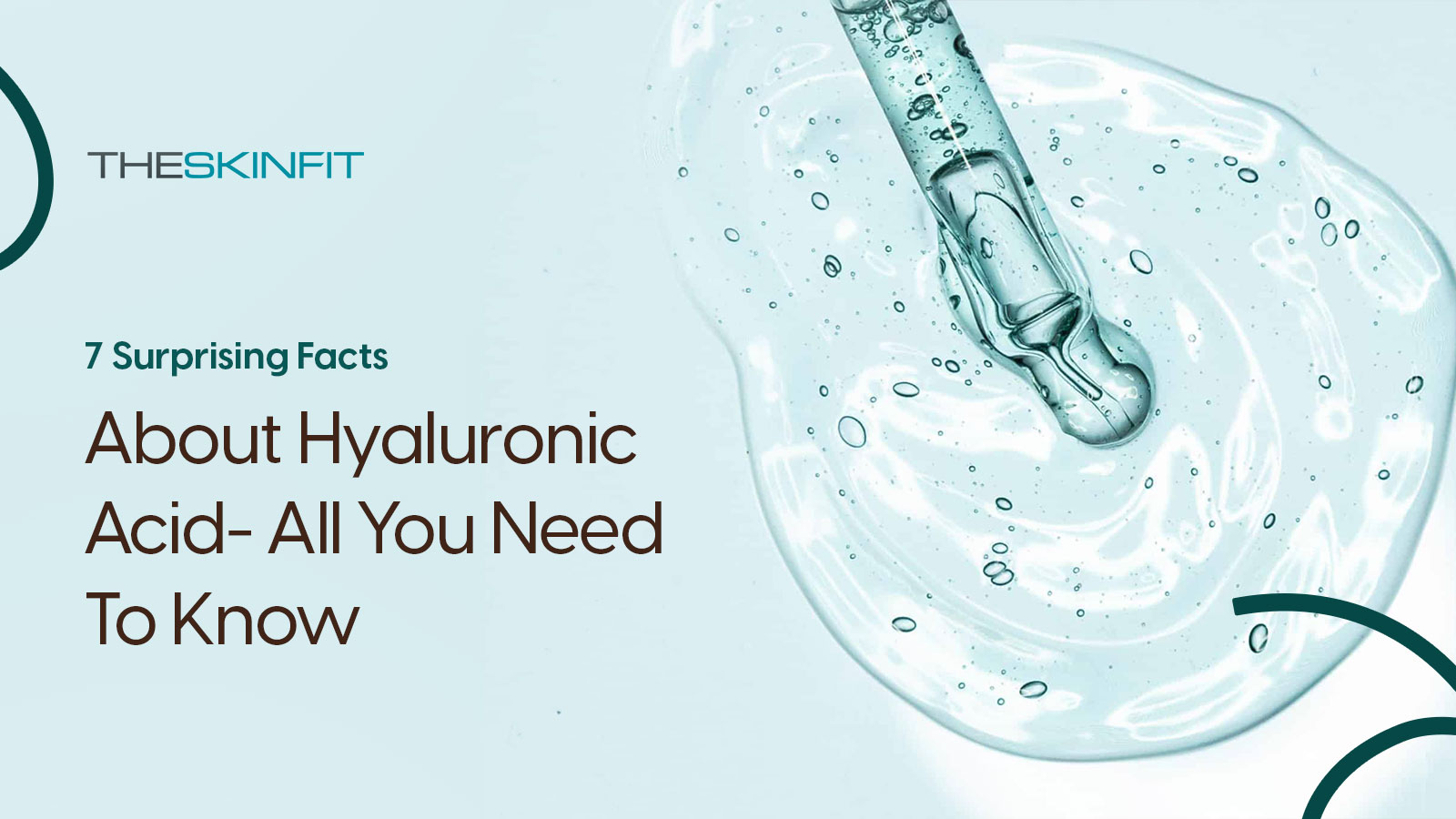Yes, everyone is familiar with the Fountain of Youth. It is a mythical spring that, according to mythology, has the ability to restore youth and energy to people who drink it. Literature and mythology have used tales from ancient times.
Similarly, there is great interest in utilizing hyaluronic acid to prevent aging. Hyaluronic acid has been touted as a "fountain of youth" for this exact reason. Unfortunately, neither ingesting nor applying it topically will delay the onset of age-related changes.
In this article, you will discover the seven essential properties of hyaluronic acid.
What is Hyaluronic Acid?
Hyaluronic acid makes the skin look younger, which makes it an excellent treatment for older people. Because it reduces inflammation and restores moisture to the skin, it is helpful for dermatitis and other skin irritations.
What does Hyaluronic Acid do to your Skin?
Hyaluronic acid has several uses. People use it in several ways. They usually take it orally as a supplement, but it may also be used topically (in serums, eye drops, and injections). Its main function is water retention, which keeps tissues flexible.
Here are some facts about this great remedy, which may be diminished in the skin due to factors including age and exposure to the sun's ultraviolet rays, tobacco smoke, and environmental toxins.
7 Hidden Facts about Hyaluronic Acid
Hyaluronic acid has been intensively investigated since its 1950s discovery. Most connective tissues contain it, which supports several functions. However, in the 21st century, HA's popularity grew in dermatology and aesthetics. In the early 2000s, hyaluronic acid took the place of collagen in dermal fillers because of its ability to hold water.
Just seven hyaluronic acid facts are shown here.:
1- Promotes Skin Cell Regeneration
According to a study, hyaluronic acid (HA) is essential for forming extracellular matrix molecules and interacting with epidermal cells in their microenvironment.
It takes roughly 28 days for new skin cells to reach the skin's surface. By the time a person reaches the age of 25, collagen and elastin synthesis, along with cell regeneration, begins to slow down. As we become older, it might take up to 90 days for new skin cells to migrate to the skin's surface.
Hyaluronic acid helps improve skin cell regeneration by providing more hydration and barrier protection, but it won't speed up cellular renewal. This results in more radiant skin and stronger cells.
2- Reduces Wrinkles and Fine Lines
Hyaluronic acid's moisturizing and hydrating effects on dry skin may make a big difference in the quality of life of people who have it. The dermis of youthful skin is saturated with HA, making it plump and supple. However, the quantity of HA in the skin declines with age, and by the time we reach adulthood, it has dropped to around 5% of its initial level.
It's essential to start taking care of your skin early. The skin benefits from hyaluronic acid, whether you're twenty or seventy.
Hyaluronic acid's ability to attract and retain water also contributes to the diminishment of the appearance of fine lines and wrinkles. Since it won't have to work as hard to keep its moisture, the skin can allocate more energy to producing new skin cells when it's well-protected and moisturized. As a result, the skin's cells soften and smooth out.
3- Helps with the Dry Eyes
Dry eye syndrome affects around 1 in 5 seniors because of diminished tear production or excessive tear evaporation. Caused by dry eyes and a lack of tear fluid, this condition may be uncomfortable and can affect your eyesight.
As a result of its remarkable capacity to hold water, hyaluronic acid is often used as a treatment for dry eyes. In addition to its usage in post-operative care, hyaluronic acid eye drops have found widespread use in ophthalmic surgery due to their ability to reduce inflammation and speed wound healing.
It's unclear whether the advantages would also apply if you ingested them orally. However, it has been shown that topical usage may help relieve dry eye symptoms and improve overall eye health.
4- Treats Eczema
Eczema is a skin disorder characterized by severe inflammation and irritation. The skin's redness, itching, and dryness are all symptoms of eczema, a chronic inflammatory skin disorder. A disruption of the skin's natural barrier is thought to play a role in the development of eczema by making the skin more susceptible to moisture loss and irritants.
Hyaluronic acid helps ease the symptoms of eczema because it helps fix the skin's barrier function and brings back the skin's natural moisture levels. In one test, the hyaluronic acid foam was easier to use and worked better to treat eczema than a ceramide-based emulsion cream.
5- Protects the Lipid Barrier
The skin's primary role is as a protective barrier for the body. Our skin has a self-evident purpose: it shields our vital organs, muscles, bones, etc., from environmental hazards. But the skin also protects the inside organs from the barrage of toxic chemicals they are exposed to everyday.
The epidermis is the skin's outermost layer and is the first to be damaged by the environment (toxins). The fatty acid (lipid) epidermal barrier (which prevents water loss and irritant penetration) diminishes with age.
Premature aging may be caused by exposure to UV radiation from the sun, breathing in polluted air, or engaging in certain harmful behaviors (such as smoking) that are common amongst humans. The skin becomes more damaged and prone to premature aging signs including fine lines and wrinkles, dark patches, and dryness.
When applied to the skin, hyaluronic acid helps reinforce the skin's natural barriers, which helps lock in moisture for a more intense moisturizing impact. This could make the lipid barrier stronger over time and slow down how fast it breaks down.
6- Speeds Up Wound Healing
Hyaluronic acid promotes rapid wound healing by controlling inflammation and encouraging new blood vessel growth in the affected region. Since it is antibacterial, it may be put on wounds to help prevent infection.
By reducing inflammation and directing blood flow to the injured region, hyaluronic acid speeds up the healing of wounds. Hyaluronic acid helps the skin retain moisture and promotes tissue regeneration, both of which are essential for a speedy recovery from injuries. It possesses anti-inflammatory and wound-healing effects. Studies have shown that it inhibits tissue damage and modulates the healing process.
7- Relieves Joint Pain
When the joints are lubricated, it is less likely that the bones will grind against one another and produce discomfort. Joints can be lubricated with joint injections. The pain associated with aching joints is alleviated by the lubrication HA provides. Medicines used to treat these symptoms, including nonsteroidal anti-inflammatory drugs or corticosteroids, were more effective when combined with hyaluronic acid.
On the other hand, hyaluronic acid has been linked to negative responses and allergies in certain persons. It's important to do a test patch fully applying a new product to your skin. Injecting hyaluronic acid into the affected joint has been shown to be effective in reducing discomfort.
However, a study of nearly 21,000 people indicated a slight improvement in pain relief and a much higher risk of side effects.
The Bottom Line
It is well-known that hyaluronic acid has positive effects on the skin, including reducing fine lines and wrinkles, alleviating dry skin, and accelerating wound healing. It has the potential to reduce the pain felt in joints caused by osteoarthritis.
Hyaluronic acid has several applications, from alleviating dry eye symptoms with eye drops to alleviating bladder pain using a catheter. Hyaluronic acid is a good supplement for several health problems, especially those that affect the skin and joints.
So, what are you waiting for? Explore TheSkinFit Pakistan's leading online cosmetics and beauty store.

